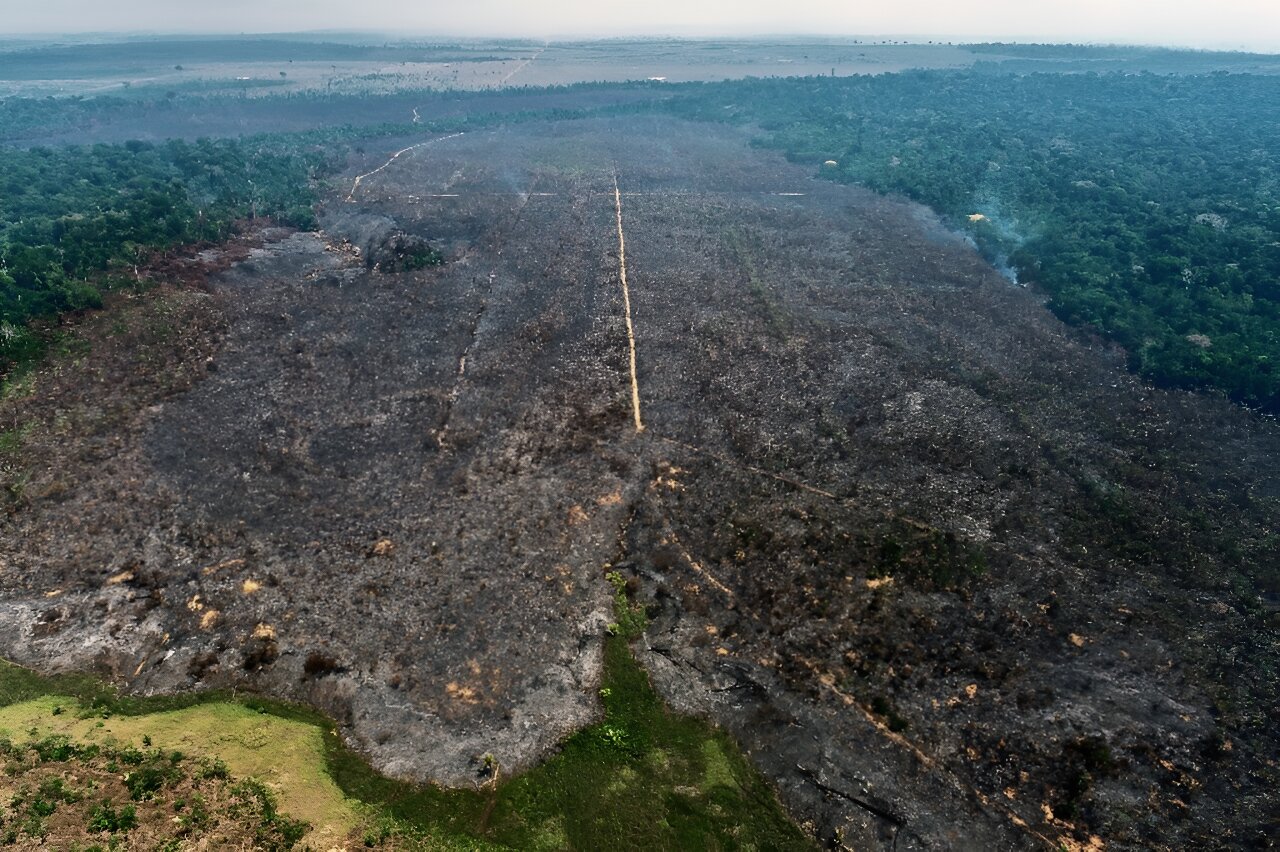- cross-posted to:
- worldnews@lemmit.online
- cross-posted to:
- worldnews@lemmit.online
Ive heard of eco-terrorism but this is ridiculous
I know your comment was light-hearted in nature, but I’d like to point out from the article:
"Investigators say the Rio Preto-Jacunda reserve is >bordered by ranches with a record of environmental crimes, >including repeated encroachments on the reserve.
Razing protected rainforest for pasture is an illegal but >lucrative business in Brazil, the world’s top beef exporter.
The crime often hits remote, hard-to-police nature reserves, >overlapping with other organized criminal activities >destroying the Amazon, including illegal logging and gold >mining."
These are people looking to make a buck with a ‘fuck you, got mine’ attitude. And it’s happening all over the world in grey-areas with regards to law enforcement. Burning down stuff is one of the favoured methods, especially if you can bribe officials to say that it was an accident (as does not seem to be the case here, however so props for that for what it’s worth).
The article also mentions death threats by the ones doing the arson towards those against their interests. People are the reason we can’t have nice things.
Yeah those ranchers should be executed.
This is a case of ‘if you don’t laugh you’ll cry.’
It’s really fucking horrendous in reality. And I don’t expect Brazil to have the means or inclination to deal with this appropriately either.
deleted by creator
Do the same thing they do for poachers, have armed guards that shoot to kill and ask questions later.
As nice as it sounds, I don’t think it’s feasible. The Amazon is absolutely massive and not very populated. The logistics of keeping armed guards all around the protected areas sounds like a nightmare. The only way I can see deforestation actually stopping is if cattle, soy and wood stop being lucrative businesses somehow.
I mean, couldn’t policies be attempted to at least make the business less lucrative in protected areas specifically? For example, if a protected area burns down, having a policy of occasionally inspecting that bit of burned land and confiscating any cattle found grazing there, to make illegally cleared land more risky to use?
That’s probably closer to what they actually try to do, which is much more reasonable but still requires a lot of resources. The problem is, there’s a lot of money behind these criminals and not a lot of political good will towards preservation (right-wingers here basically think the forest stands in the way of our progress, so less environmental protections = more jobs and development, somehow) so getting funds to protect our forests is usually an uphill battle.
I guess the only real change we could effect is if “bee from Brazil” was flat out banned in a lot of western countries. Could not be imported. But heh, as if the industry big wigs who could not care any less (they’ll all be dead from old age by the time this truly has significant big fallout so they don’t care, naturally) will do that.
But yeah, need to remove the market to truly impact this, beyond making it illegal in the first place.
The human race will get what it deserves. You think everyone will accept climate change after it kills a billion+ people?
Nope, it feels like most people are too far gone for that and they’ll never accept it. All thanks to these dumb politicians that took bribes to cover it up for years and years. Thanks for making our futures so much worse…
Then it went up in flames, allegedly torched by land-grabbers trying to reclaim the territory for cattle pasture.
A little hippie in me ask people to seek out and pay for more sustainable produced meat, buy cultured meat in the future, or just eat less meat.
deleted by creator
This risk of unreliability is one downside of carbon capture using trees or other plants.
Unless the carbon is moved under ground, where it cannot escape again due to accidents or arson or the like, it’s not safely removed.
Trees are cheap and effective, but humans are destructive. If we just left nature alone, cut meat production to a level where we could pull everything back to older fields, it would recover relatively quickly.
Meaning we need to prosecute and take punitive actions against humans and corporations who just can’t cope with not being destructive. Any business that’s willingly involved needs to lose everything. Make it impossible to profit from, remove the incentives for farmers when the money disappears and loans can’t be given out because the banks stopped existing.
The trees would die and rot at some point, which releases the CO2 they stored. We cannot keep capturing CO2 without increasing forest areas, and that’s expensive. However, artificial carbon capture does not fare much better so the best strategy is to just burn less stuff. It is still more effective to offset fossil fuel power plants with clean electricity (as long as there is no oversupply) than using it for carbon capture.
Trees replace themselves. So yes, forests store carbon, rather than specific trees. Also, dead trees don’t just evaporate into the atmosphere. Other species eat them, etc. Over time, more and more carbon will be stored somewhere, if it’s left alone.
Dead trees don’t evaporate (except for some of their water which isn’t too relevant); the decomposing (micro)organisms that eat them release CO2 - about as much as burning the trees would. Yes, an old growth forest will be storing more CO2 per unit of area than a newly created one but that does not increase very fast and after a century, the forest will have reached most of its carbon storage capacity it will be able to store for the next millenium - at this point, basically only oxygen-free peatbogs where dead biomass does not decompose (as the decomposers cannot breathe) will provide extra carbon storage. This will eventually turn into coal (and sunken sealife into oil), storing its accumulated energy as hydrocarbons that won’t be touched unless some pesky intelligent species start an industrial revolution.
Carbon capture is expensive: you need to isolate CO2 from the atmosphere, which takes energy, and turn it back into solid or liquid chemicals, which by laws of thermodynamics takes more energy than burning that amount of corresponding hydrocarbons. Then they need to be stored somewhere where nobody will find and burn them to enjoy cheap energy from them like we’ve been doing for the past 200 years. So we’ve had cheap energy at the expense of the environment, and we need to expend at least as much energy to get all that nasty carbon back out of the atmosphere. Thunderf00t made a very informative video about all this.
Here is an alternative Piped link(s):
Piped is a privacy-respecting open-source alternative frontend to YouTube.
I’m open-source, check me out at GitHub.
Sounds good, yes! That can reduce the risk from arson. What remains is the risk from natural pests, droughts and wildfires, which increase due to climate change.
When weighing our options, we should consider their real-world value, not an optimistic estimate under ideal conditions. Trees could be great, but there are many things which can go wrong over the decades that a tree needs to grow.
throws up hands Might as well do nothing!
Or hype tree planting less, and rely more on industrial solutions. Or use tree planting, but make sure the plant matter is stored underground frequently, so it cannot get back into the atmosphere. Or weigh in other arguments and realize this risk of unreliability is not that big and acceptable.
Or write a snarky comment and do nothing!
I’ve been waiting 30 years for industrial solutions but it is obvious that marketing and advertising to maintain the status quo of legacy companies is still a better roi.
This is a regulatory issue not a market failure.
Also I’m sure plastic recycling on a large scale is just around the corner. The plastic packaging on my plastic products keeps saying so. (/s)
it is obvious that marketing and advertising to maintain the status quo of legacy companies is still a better roi.
Yes, sadly.
This is a regulatory issue not a market failure.
I think it’s both. Emitting is practically free, and removal means costs, not profit. The economic incentives are to emit, not to remove. The external costs of emissions are not covered. This is a distorted market and a market failure. And this market failure can be fixed by regulations, for example carbon pricing, or subsidizing effective carbon removal. Both are still under threat from marketing and advertising, or lobbying.









